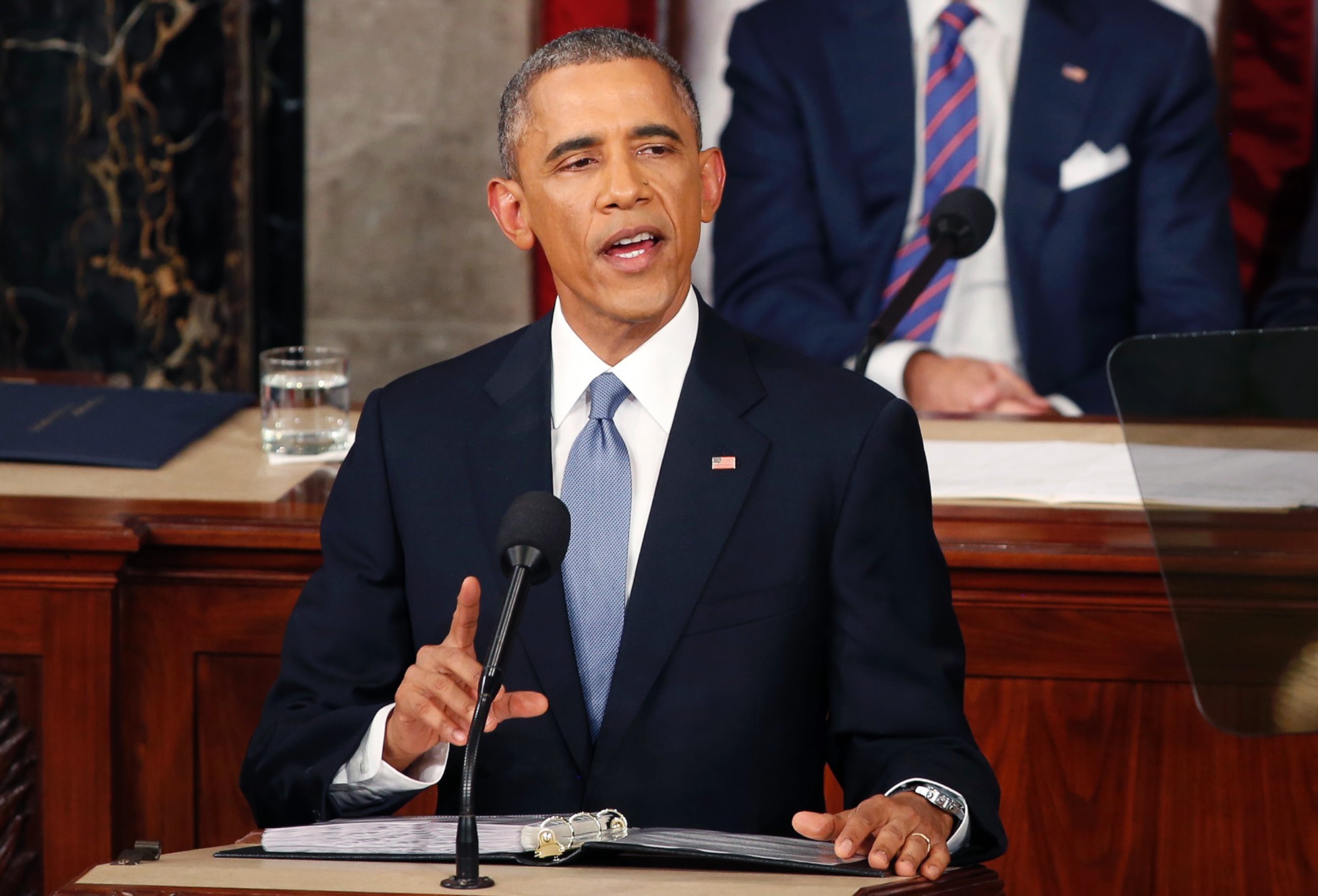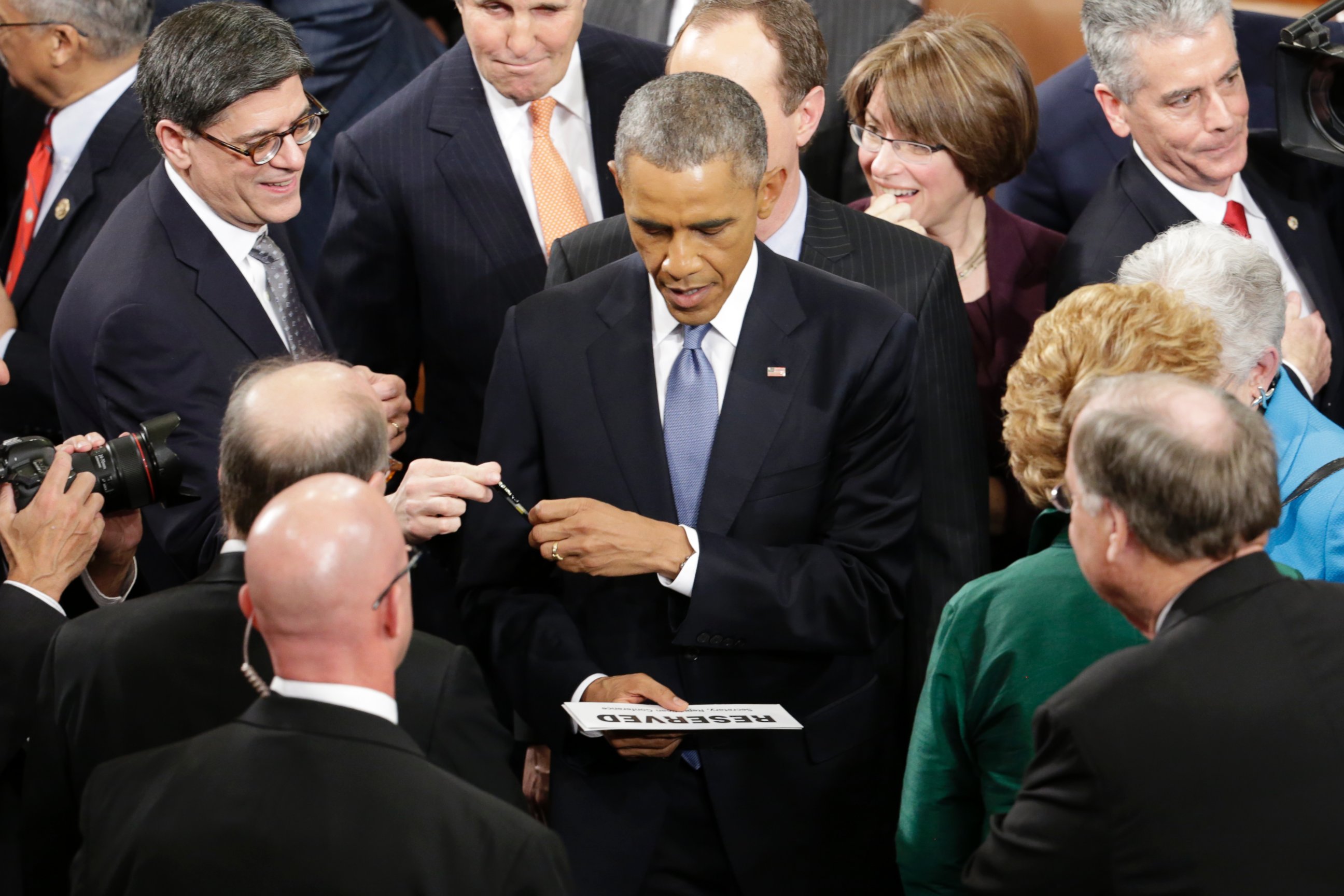President Obama's Legacy Turn: From Yes We Can to Yes We Did
Obama focuses on the economy and not world affairs in State of the Union.
— -- The policies may look small, and their prospects definitely look grim. But the goals are big -- and the stakes have the potential to be all-consuming.
Six years to the date after making history as he was first sworn in to his office, and two months after an electoral drubbing that effectively erased what was left of his legislative hopes, President Obama used his next-to-last State of the Union address Tuesday night to make a turn toward securing his legacy.
He's hoping to get there through a series of smaller turns. He's boasting of a strengthened economy, carrying a mini-turnaround in his own political fortunes, and touting new policies that he casts as helping a forgotten middle class.
It all feeds into the big turn -- from "yes we can" to "yes we did." Looking ahead, he's going even bigger, steering toward a brand of economic populism that's familiar to anyone who's been watching Sen. Elizabeth Warren closely.
"It's now up to us to choose who we want to be over the next 15 years, and for decades to come," the president declared. "Will we accept an economy where only a few of us do spectacularly well? Or will we commit ourselves to an economy that generates rising incomes and chances for everyone who makes the effort?"
Obama made no mention of the fact that voters rejected his party in November, in historic fashion. He did not reference the new Senate majority leader, Mitch McConnell, or the man who sat over his left shoulder as he has at every State of the Union since 2011, House Speaker John Boehner.

If anything, the president sketched an economic agenda designed to provoke rather than accommodate Republicans -- programs that include vast new spending and higher taxes on the wealthy.
His focus was not on world affairs, despite the real worries sparked by recent events in Western Europe. He glossed over the march of ISIS, the complications surrounding an Iran nuclear deal. He didn't say the word "Yemen."
In Obama's telling, it was a "breakthrough year for America," and a time to "turn the page," as he reached to his political past to make a case for the future.
This speech was never designed to present bills that have actual shots at being enacted by Congress. Six years into a presidency, with the opposing party now in full control of Capitol Hill, a legislative agenda is fantasy talk coming from the White House, anyway.
What his speech does, though, is put the president in the middle of a major debate that's coursing through American politics, one that will play out inside of both parties through the next presidential election.
The debate concerns a middle class that feels left behind in the current recovery. For Democrats, as voiced most prominently by Warren -- whose smile seemed particularly broad Tuesday night -- it's a piece of unfinished business around income inequality that sparks frustration, and even anger from some corners.
Fifty-six percent of Americans still view the country as headed in the wrong track, in the latest ABC News/Washington Post poll. That's 12 points better than right before the election, but hardly an endorsement of the current course.

The president, however, can boast of a 50 percent approval rating now, for the first time in more than 18 months. There's an even split on trusting him or Republicans more on the economy, but broad support for his plans for college affordability, in addition to energy and environmental initiatives.
This, then, is Obama's play: a recommitment to fighting for the middle-class, as a supplement to his forgotten "year of action" rhetoric. His hope is to put his vision and his party on the side of a skeptical swath of voters who've found fewer reasons to support Democrats in recent years.
Realistically, he's not expecting Republicans to join him in his efforts. But he's practically daring them to oppose him all the same; judging from the stoic facial expressions across the House floor, they'll take that challenge.
This president more than most can appreciate the whims of public sentiment. He knows firsthand the unpredictable nature of world events. His bump in approval rating may have trouble outlasting an uptick in gas prices.
There were shades of the long-ago -- and often forgotten -- Obama for those reasons. He made explicit references to his famous Democratic National Convention speech in Boston in 2004, and echoed his equally famous Iowa caucus victory speech, from 2008.
"I still think the cynics are wrong," Obama said. "I still believe that we are one people. I still believe that together, we can do great things, even when the odds are long."
Going into his fourth quarter, though, there is no presidential jaunt to the middle. The president instead chose to rejoin and reinvigorate allies inside his base.
Yes, he can imagine a time when "we did something different." The fight, as he well knows, will last far beyond his own presidency.




